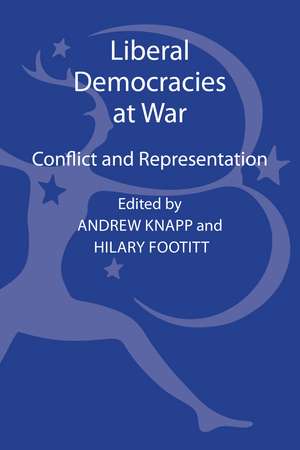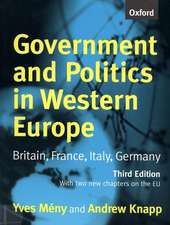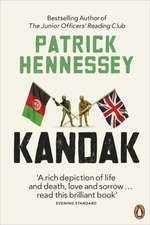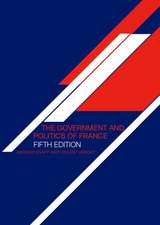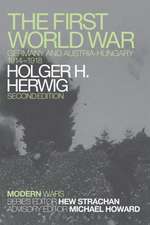Liberal Democracies at War: Conflict and Representation
Editat de Professor Andrew Knapp, Hilary Footitten Limba Engleză Hardback – 31 iul 2013
| Toate formatele și edițiile | Preț | Express |
|---|---|---|
| Paperback (1) | 180.44 lei 6-8 săpt. | |
| Bloomsbury Publishing – 31 iul 2013 | 180.44 lei 6-8 săpt. | |
| Hardback (1) | 774.62 lei 6-8 săpt. | |
| Bloomsbury Publishing – 31 iul 2013 | 774.62 lei 6-8 săpt. |
Preț: 774.62 lei
Preț vechi: 991.80 lei
-22% Nou
Puncte Express: 1162
Preț estimativ în valută:
148.23€ • 158.50$ • 123.59£
148.23€ • 158.50$ • 123.59£
Carte tipărită la comandă
Livrare economică 18 aprilie-02 mai
Preluare comenzi: 021 569.72.76
Specificații
ISBN-13: 9781441146847
ISBN-10: 1441146849
Pagini: 264
Dimensiuni: 156 x 234 x 23 mm
Greutate: 0.57 kg
Ediția:New.
Editura: Bloomsbury Publishing
Colecția Bloomsbury Academic
Locul publicării:London, United Kingdom
ISBN-10: 1441146849
Pagini: 264
Dimensiuni: 156 x 234 x 23 mm
Greutate: 0.57 kg
Ediția:New.
Editura: Bloomsbury Publishing
Colecția Bloomsbury Academic
Locul publicării:London, United Kingdom
Caracteristici
Presents a thorough examination of the representation of violence, including attention to representations by victims.
Notă biografică
Andrew Knapp is Professor of French Politics and Contemporary History at the University of Reading, UK. Hilary Footitt is Senior Research Fellow at the University of Reading, UK.
Cuprins
1. Introduction Andrew Knapp and Hilary Footitt Part One: Liberal Democracies at War 2. Mapping Visual Violence in Germany, France and Britain, 1914-18 Joëlle Beurier 3. The Allied Bombing Offensive in the British Media, 1942-45 Andrew Knapp 4. 'I would too, wouldn't you?' Regarding the Deaths of Others During the Vietnam War Kendrick Oliver 5. Clean War, Invisible War, Liberal War: The Clean and Dirty Politics of Guantánamo Elspeth Van Veeren Part Two: Violence and War 6. 'At least I Stayed Decent': Invisible Violences, Interrogation and Representation in Post-War Germany Simona Tobia 7. Wartime Rape: The Politics of Making Visible Joanna Bourke 8. The Underside of 'Occupation' Hilary Footitt Part Three: The Victims' Gaze 9. Writing War in the Enemy Tongue: Symbolism, Realism and Surrealism in Francophone Novels of Algeria's War of Independence Sara Poole 10. 'We Teach Life, Sir': States of Siege, Youth and Filmed Testimony Caroline Rooney and Rita Sakr 11. Femininity, Feminism and the Representation of Torture Sue MalvernIndex
Recenzii
This is an exciting and thought-provoking work. It provides examples from a range of cases from the First World war to the War on Terror, with detailed analysis of specific incidents and a generous portfolio of illustrations.
This is a disturbing and important collection of essays. It shows how the waging of war over the past century has distorted or destroyed the conditions that make liberal democracy possible. Essential reading for anyone interested in the corrosive and enduring effects of war.
One of the great puzzles of the past century is how liberal states can justify the way they wage war or counter-insurgency while paying lip service to democratic principles and the rule of international law. This volume succeeds admirably in showing just how morally complex or morally compromised liberal war-making can be. This is an excellent introduction to a question of perennial significance.
In his great work "On War" Clausewitz pointed out that in wartime the intentions of political leaders and the plans of military commanders will always be distorted by "the passion of the peoples". The events of the last two hundred years have only shown how right he was. The greater the participation of peoples in their government, the greater the probability that public opinion, so far from moderating the conduct of war, is only likely to make it more barbarous. This excellent collection shows how, and why, this so often comes about at every level, from the political leadership to the conduct of armed forces on and behind the battlefield. It is essential reading for all who believe that the superior morality of their own societies will justify the use of military force to extend it.
This is a disturbing and important collection of essays. It shows how the waging of war over the past century has distorted or destroyed the conditions that make liberal democracy possible. Essential reading for anyone interested in the corrosive and enduring effects of war.
One of the great puzzles of the past century is how liberal states can justify the way they wage war or counter-insurgency while paying lip service to democratic principles and the rule of international law. This volume succeeds admirably in showing just how morally complex or morally compromised liberal war-making can be. This is an excellent introduction to a question of perennial significance.
In his great work "On War" Clausewitz pointed out that in wartime the intentions of political leaders and the plans of military commanders will always be distorted by "the passion of the peoples". The events of the last two hundred years have only shown how right he was. The greater the participation of peoples in their government, the greater the probability that public opinion, so far from moderating the conduct of war, is only likely to make it more barbarous. This excellent collection shows how, and why, this so often comes about at every level, from the political leadership to the conduct of armed forces on and behind the battlefield. It is essential reading for all who believe that the superior morality of their own societies will justify the use of military force to extend it.
